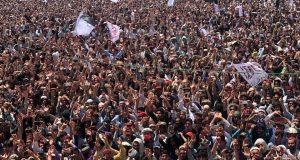In pre-Taliban era when the last president of Afghanistan, Dr. Najibullah was ruthlessly hanged to death, Kabul was frozen with terror of the deadliest civil war.
The atrocities which followed by are unspeakable.
Afghanistan, a land, where you can take any of your war with your enemies, became a living hell for its masses, and paid an unbearable price to be a democracy.
Except Turkey all other stakeholders in Afghanistan, for instance, the United States, Pakistan, China, India, Egypt and Saudi Arabia took their wars against their rivals to this country and put their share in its destruction.
This civil war left forty thousand married women as widows in Kabul province only.
Now imagine how many widows thence would have been there across Afghanistan.
The United States and its western allies soon after the Soviet Union withdrew its last troop on 14 February 1989 shut their embassies in Kabul.
When Mujahideen arrived in Kabul they were not feted as heroes as the civil war had already broken out.
Each of the Mujahideen faction was trying to get the lion’s share.
To tame the warring Mujahideen, a more dreadful group of fighters was imposed on them, which eventually subdued them.
The Taliban, madrassa-turned Islamist fighters soon became a political power in Afghanistan to reckon with.
They maintained peace in major parts of Afghanistan.
Pakistan and just a few gulf states recognised the Taliban as a government, but for the rest of the world, the Taliban was a people of the stone age, and Afghanistan was a failed state left over to Pakistan as its backyard, therefore, Pakistanis and Arabs recognised them as a government.
After 9/11 terror attacks followed by the ouster of the Taliban in 2001, Afghanistan started off as an infant-democracy from a completely failed state where only one packet salt used to be sold for 30 thousand Afghanis (Afghan currency) and if you wanted to buy a motorcar you needed a sack stuffed with Afghanis to pay.
Afghanistan which has already been torn apart by wars and is already fighting tooth and nail to subdue terrorism, is nevertheless in recent years hit by a new crisis. This new crisis is stirred by electronic identity cards.
This issue has already been addressed in the constitution of Afghanistan which says that this country is an Islamic republic, which means the polity will remain a blend of Islamic theology and democracy–or the laws of the land will be a mixture of divine laws and man-made laws.
The constitution says all the citizens of Afghanistan whether living at home or abroad are Afghans, yet despite that there is a serious rift over the mention of “Islam” and “Afghan” in in the new electronic identity cards.
This rupture is deepening with each passing day. Until this issue is addressed the issuance of new identity cards will remain in limbo.
The Taliban, the sworn enemy of democracy and elections in the country, who severed fingers of some of the voters who cast their votes, has now jumped into the fray.
They warned nobody is allowed to slash Islam and Afghan from the new identity cards.
Lawmakers instead of resolving the issue in an effective manner further bedeviled the crisis.
Earlier this month the electronic National Identity Card department said the politicization of the word Afghan is the reason for the delay of the issuance of the electronic identity cards (e-Tazkira).
The Meshrano Jirga (Senate) on Tuesday blasted the lower house (Parliament) for they it handled the issue.
Latif Pidram, a lawmaker from Tajik ethnic community and people of his ilk say there must not be any mention of Islam and Afghan in the new identity cards have been caught a angry criticism.
They are also rebuked for they fearlessly say that Durand Line is an international border and support its fencing by Pakistan.
In response the Justice Party of Afghanistan (JPA) supporters said the word Afghan is their nationality.
“Whatever comes we will add the word Afghan in our ID cards by force, it is our red line, they say.
The Taliban is making efforts to exploit the situation. Ethnic issue in Afghanistan is a matter of grave concern as students have been stabbed to death on ethnic issues inside university hostels during Karzai’s tenure when Kabul university was named after late Ustad Rabbani. Dari, the cousin language of Persian, is the language of Tajik ethnic minority, yet it has always remained the lingua franca and is trying to be even in the face of Pashtuns’ struggle to bring Pashto at par with Dari.
Pashto and Dari, both are the two recognised official languages, however, Pashto historically has faced a kind of tacit conspiracy, which didn’t let it to develop.
This crisis erupted during the former president Hamid Karzai’s tenure.
He got away with it by putting it on hold, which is now testing the mettle of the national unity government of Ashraf Ghani.
Hamid Karzai could have addressed this issue in an effective way as his was not a national unity government headed by two leaders.
And now it is him who is held in criticism. Those who want the new identity cards must carry the mention of Islam and Afghan chide Karzai, for empowering these anti-Pashtun elements, yet they forget that it was not Karzai, but the United States which empowered these elements from ex-northern alliance.
Those who oppose any mention of Islam or Afghan in the electronic identity cards say that Afghanistan is home to too many ethnic groups such as Tajik, Hazara, Ubzbek, Aimaq, Pashai, Baloch, and Turkmen therefore the mention of the word ‘Afghan’ is an attempt to impose the identity of one major ethnic group on the rest of people. For them Afghan denotes Pashtuns.
The advocates of Afghan word in the new identity cards say that whenever an Afghan goes abroad he introduces himself as an Afghan and not as a Tajik or a Hazara then isn’t this duplicitous to oppose Afghan identity at home while you make no fuss when you are abroad.
Those who are in favor of “Afghan” word claim that if they give in this time later on the opponents will even dare to ask for the renomenclature of Afghanistan.
The advocates say that all citizens of Afghanistan are Afghans while those who are stressing on ethnic identity to be mentioned in the new identity cards are undermining the national unity.
While looking into the atrocities committed in the civil war and stabbing cases of the students over ethnic issues, this e-Tazkira issue should in no way be politicised, or else none will stave off Afghanistan’s dive into a new war, this time not being imposed from outside world, but sparked by internal bickering.
By Roohul Amin:
The author hails from the tribal belt in Pakistan. He worked as a journalist from 2006 to 2016, and currently lives in Germany.
 Pashtun Times Latest News
Pashtun Times Latest News





